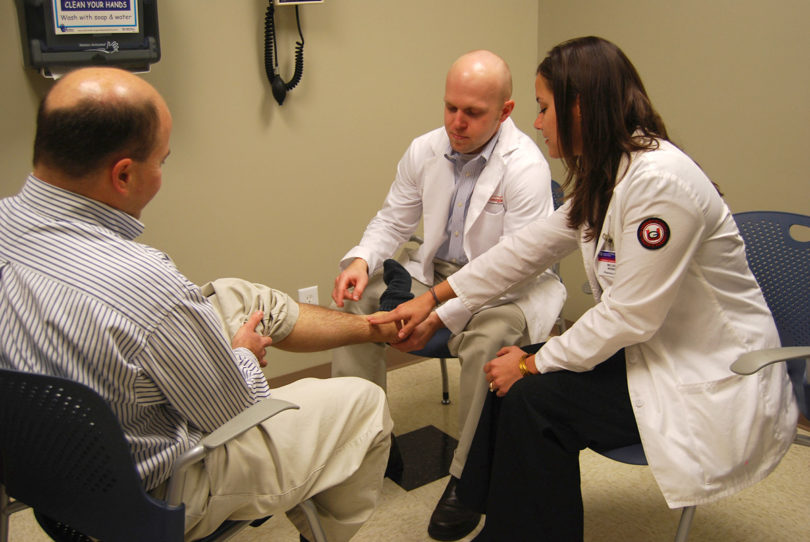The College of Pharmacy has developed a unique second-year residency program in ambulatory care at the Veterans Affairs Outpatient Clinic on Highway 29 in Athens. The community-based facility is set up to provide primary care to veterans who cannot easily access the main VA hospital in Augusta. Approximately 4,000 ambulatory patients from the local population of 30,000 eligible veterans use the facility.
The collaboration provides a distinctive training environment for residents by combining clinical practice with the development of teaching skills, according to Beth Phillips, a clinical associate professor at the pharmacy college and director of the PGY2 Ambulatory Care Residency Program.
“Our residency goals and outcomes are the same as with any specialized second-year residency,” she said. “In the pharmacotherapy clinic, we provide disease state management, optimize medication usage and educate patients about managing their diseases, whether that might be diabetes, hypertension, chronic obstructive pulmonary disease or hyperlipidemia.”
One of the distinguishing aspects of the program is that the VA works under a progressive scope of practice and allows prescriptive authority for pharmacists. Here pharmacists can write prescriptions and even change dosage or add medications as indicated for the disease. Additionally, they can order lab tests related to the disease states they are managing.
“Needless to say, this type of practice greatly enhances the educational opportunities for our resident,” said Phillips, who joined the pharmacy college faculty in 2007 after working for 11 years as a clinical pharmacist and faculty member at the University of Iowa and directing the PGY1 and PGY2 Ambulatory Care Residency programs at the University of Iowa hospitals and clinics.
Another advantage of practicing in this environment is that medications are provided to all patients. Prescriptions are sent to a central mail-order processing facility in Charleston, S.C., and patients receive their medications in the mail in about 10 days.
“No medications are actually dispensed from the clinic,” said Phillips. “Acute care needs for chronic patients are handled by Athens Regional Medical Center and Hodgson’s Pharmacy.”
Josh Guffey is the first resident to participate in the new 12-month program. His decision to undertake an ambulatory care residency was unique in that his first-year residency was spent in a community pharmacy setting rather than in a hospital, which is the customary practice site prior to undergoing the more specialized second-year residency.
“For me there are certain parallels between the two residency experiences that I enjoy,” he said. “Both work with patients in an outpatient setting and both provide the opportunity to educate patients about disease state management and therapeutic life style changes. I spent a lot of time talking with patients during the community pharmacy residency about the same illnesses that I now manage in an ambulatory care setting.
“An important difference with this residency is the ability to actually develop relationships with patients in the clinic as a result of providing continued care,” he added. “And I especially like the experience of working in the VA system with its broad scope of practice for pharmacists.”
The VA clinic also offers a unique opportunity for clinical research, another important component of the second-year residency program, according to Phillips.
“Since the VA operates as a closed system, all patient records are stored in a main database. As we work with our patients, we can easily access their files to determine their medical history, medication usage and adherence,” she said. “Many of our patients are more than 50 years old and have complex disease states; most have multiple diseases.”
Guffey’s project centers on disease state outcomes in patients referred to the pharmacotherapy clinic. He notes whether the patients meet the guideline-driven goals established for certain diseases based on risk factors and medical history; whether the services provided by the clinic impact medication adherence; and whether patients have shown improvement even if the goals have not been met. A final component looks at patient satisfaction with pharmaceutical services and care. Guffey will present his findings at the annual Southeastern Residency Conference this spring.
In addition to working with patients in the pharmacotherapy clinic, Guffey spends time in the anticoagulation and lipid clinics and in formulary management.
Along with developing expertise in ambulatory care disease state management, residents are provided with specific teaching opportunities that allow them to develop a foundation for an academic career.
“The clinical aspect of the program prepares the resident for an active clinical practice,” said Guffey. “The teaching component of the residency supports my plans for an academic career. “
He works with pharmacy students as a preceptor in the clinics and as an instructor for both didactic and small group learning. In addition he serves as a facilitator in the college’s Pharmacy Skills Laboratory where pharmacy students learn and practice the clinical skills needed for direct patient care.
“The teaching requirement allows me to gain more experience in what is required to become a successful clinical-track faculty,” he said, adding that he will receive a teaching certificate once he’s done.





